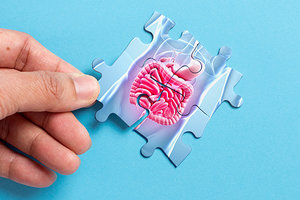I recently came across a new research article from Penn Medicine News entitled "Gut Microbes Can Boost the Motivation to Exercise, Penn Medicine Study Finds." While the study highlighted research in mice, it provides fascinating food for thought regarding the connection between the health of the digestive system and motivation to exercise. The health of the microbiome and mental motivation has always been a subject with extremely important clinical implications in my private practice.
Relevant TCM Concepts
 When treating patients who are seeking to use exercise to improve their health, I always use points along the spleen and stomach meridians. I do this based on two basic TCM concepts: "The spleen is the source of qi and blood formation" and "The yangming meridian is full of qi and blood."
When treating patients who are seeking to use exercise to improve their health, I always use points along the spleen and stomach meridians. I do this based on two basic TCM concepts: "The spleen is the source of qi and blood formation" and "The yangming meridian is full of qi and blood."
These two fundamental concepts have obvious implications for helping patients either improve their existing exercise program or begin a new one: The more qi and blood a patient has, the more energy and vitality to fuel a healthy, active lifestyle.
Obviously the points on the spleen and stomach meridians have a wide range of clinical activity beyond just boosting energy. These two organs are essentially the root of all digestive processes within the human body, affecting the entire spectrum of physical and mental vitality.
My clinical experience has shown that using points on the spleen and stomach meridians helps improve almost all aspects of patients' lives. This new study on gut microbes boosting the motivation to exercise hints at why this may occur.
While pondering "The spleen is the source of qi and blood formation" and "The yangming meridian is full of qi and blood" in relation to the Penn Medicine News article, two other statements of fact came to mind: "The spleen stores ideation" and "Thought is the mind of the spleen." These statements provide clues to how we can view this Penn Medicine research in light of the practice of traditional Chinese medicine, and how points related to digestion can influence motivation in patients.
While this subject is vast and an entire book could be related on which meridians are related to and influence digestion, let's focus on two four-point acupuncture prescriptions that can be used when patients present with fatigue and mental malaise with signs of spleen / stomach qi deficiency.
Point Prescription #1
Sp 3 + Sp 6 + Ren 6 + Ren 12
This four-point formula is extremely effective for patients showing signs of spleen / stomach qi deficiency that manifests as overall fatigue, tired / sore / heavy limbs, and mental malaise.
Sp 3 is the yuan source point / shu stream point on the spleen meridian and has the actions of strengthening the spleen, harmonizing and regulating the spleen and stomach, resolving dampness, and clearing damp heat.
Sp 6 has the actions of strengthening the spleen, resolving dampness, coursing the liver qi, nourishing the blood, supplementing kidney yin, invigorating and cooling the blood, and calming the mind.
Ren 6 tonifies the qi and yang, regulates the qi, strengthens yuan qi, and drains damp; while Ren 12 is the front mu point of the stomach and has the actions of regulating the stomach qi, tonifying the spleen and stomach, and draining damp.
These four points, when combined, provide deep source nourishment on both mental and physical levels.
Point Prescription #2
Sp 4 + St 36 + Sp 9 + Ren 12
This four-point combination is extremely effective for patients suffering from signs of spleen / stomach qi deficiency that presents as fatigue, sensitive stomach with a tendency toward bloating, tendency toward loose stool, and mental malaise.
Sp 4 is the luo-connecting point of the spleen meridian and master point of the chong mai vessel. It has the actions of strengthening the spleen / stomach, controlling the chong, regulating menstruation, removing obstructions from the channel, dispelling fullness, and soothing the stomach.
St 36 tonifies the spleen and stomach, tonifies qi and blood, regulates the intestines, expels wind and damp, and resolves edema.
Sp 9 resolves damp, benefits urination, drains damp heat in the lower jiao, and otherwise benefits the lower jiao; while Ren 12, as the front mu point of the stomach channel, regulates the stomach qi, tonifies the spleen and stomach, and drains damp.
As with the first point prescription, this acupuncture point combination addresses all aspects of physical and mental vitality.
Research in Action
I hope these two four-point acupuncture point prescriptions help you and other TCM practitioners envision how research studies can be interpreted via the lens of traditional Chinese medicine and used to formulate creative treatment plans. Always remember the TCM statements of fact, as they provide important clues to taking research into the clinic via the rubric of TCM.
Click here for more information about Craig Williams, LAc, AHG.




